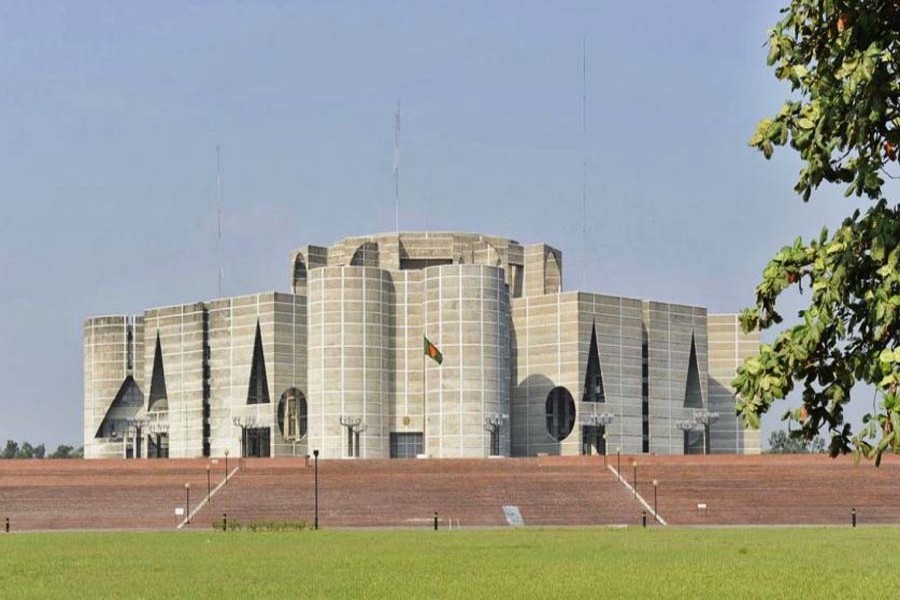Finance Minister AHM Mustafa Kamal is set to unveil on Thursday the proposed budget for the fiscal year 2020-21 (FY21), which is expected to contain suggestive measures to offset the impact of COVID-19 on the country’s economy, reports BSS.
Officials familiar with the preparations of the fiscal documents said that despite the ongoing pandemic the budget size would be Tk 5.68 trillion, which is a little higher than that of the previous fiscal. The budget for the previous fiscal was around Tk 5.23 trillion.
The Finance Division has estimated an overall possible revenue collection target of Taka 3.78 trillion for FY21.
Of the amount, Tk 150 billion is expected to be drawn from the taxable sector and Tk 330 billion from the non-taxable sector beyond the National Board of Revenue (NBR) target.
Officials said that the government was also eying for an estimated amount of Tk 40.13 billion as foreign grant.
They said that NBR set a target of mobilising Tk 3.3 trillion as revenue in the next fiscal expanding tax nets to augment government income.
The government may increase the tax-free income limit for individual taxpayers while the income tax slabs may be rearranged as well.
They said that the unprecedented situation simultaneously forced the government to contemplate reduction of corporate tax alongside granting full amnesty to black money holders.
The officials said that the government simultaneously expected an 8.2 per cent GDP growth in the coming fiscal despite different global financial watchdogs’ predictions that the deadly virus would pull down the growth in South Asia and the Pacific regions.
They, however, estimated the budget deficit to be nearly 6.0 per cent, a little over the average of 5.0 per cent estimated during the previous years.
But, the situation required the proposed budget to be more welfare oriented so more money could be spent for the poorer people whose life and livelihood was affected by the pandemic.
“The finance minister’s a budget address this year is likely to be different from other years . . . this is not going to be a conventional budget, anyway” a senior finance ministry official said preferring anonymity.
He said Kamal was likely to unveil a three-phase strategy to address the pandemic affect in terms of duration of stimulus package plans to be categorised as “short, medium and long” ones.
Officials said the budget would also tend to continue the incumbent government’s achievements but synchronise them with the reality caused by the ongoing crisis.
“The budget will seek to explore ways to expand social safety net coverage under different ongoing programmes to accommodate extra number of beneficiaries,” an official said quoting the expected amount of allocation for the purpose to be as high as Tk 321.66 billion.
The number of beneficiaries on working lactating mothers, poor mothers, tea workers, plus members of the third gender and Bede communities might increase to 1.3 million in the next financial year.
The government is likely to set a Tk 1.09 trillion borrowing target from the domestic sources to meet the deficit, of which Taka 849.8 billion will be taken from the banking sector alone.
The non-banking sources and modes like savings certificates are thought to be means to cater the rest portion of the deficit.
According to the officials, the government was likely to borrow Tk 888.24 billion from foreign sources in the new fiscal but Tk 128.2 billion of the amount would be spent for loan repayment.
The government next year is likely to spend Tk 63.8 billion on interest payments. Of this, Tk 5.82 billion will be spent to pay interest on domestic loans while Tk 55.48 billion on foreign loans.
The amount of government’s capital expenditure in the coming fiscal is likely to be Tk 36.99 billion, while Tk 5.67 billion could be on food and Tk 42.1 billion on loans and advances.
The government for the first time in decades planned to reduce the Annual Development programme (ADP) to Tk 2.05 trillion compared to TK 2.02 trillion in the outgoing fiscal.
Besides, an amount Tk 47.22 billion would be spent for special projects outside ADP, Tk 26.54 billion for food-for-work programme and Tk 25.22 billion for various other schemes.
The agriculture sector is likely to get a higher chunk of allocation alongside arenas of social security, public administration, education, power and communication.
Officials said out of the overall budgetary allocation, the health sector is likely to receive an allocation of 5.1 per cent, social safety net sector 4.7 per cent and public administration sector 6.8 per cent.
Local government and rural development sector may get 6.10 per cent, defence sector 5.4 per cent, public discipline and security 4.9 per cent, power sector 4.8 per cent, education and technology 15 per cent, agriculture 3.6 per cent and transport sector 11.4 per cent.
Among the ministry wise allocation, the local government division is likely to receive the largest slice for eight consecutive years.
This will be Kamal’s second budget to be placed in parliament as he became the finance minister nearly two years ago.
He is scheduled to hold as well a post-budget press conference on June 12 through video conferencing.


